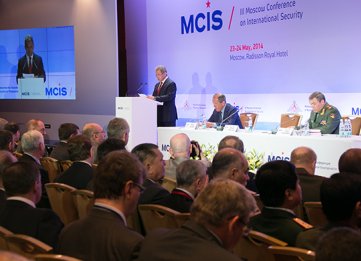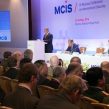
Moscow Security Conference Highlights Russian Fears of Colored Revolutions
Publication: Eurasia Daily Monitor Volume: 11 Issue: 102
By:

The Russian Ministry of Defense (MoD) hosted its third annual International Security Conference in Moscow on May 23–24. This year’s agenda was more diverse than the previous two conferences, which focused on ballistic missile defense in Europe and the North Atlantic Treaty Organization’s (NATO) enlargement at Russia’s expense. This year’s conference had special sessions devoted to Afghanistan and the Middle East. Nonetheless, NATO was again the villain: the Russian national security elite railed against what they perceived to be the Alliance’s deliberate campaign to play geopolitical games and overthrow governments in order to secure Western political and economic gains at the expense of Russia and other non-Western governments.
More than 300 public officials and private national security experts from over 40 countries attended the conference (MoD press service, May 23). Although NATO governments boycotted this year’s session, the chief architect of the conference, Deputy Defense Minister Anatoly Antonov, said that Moscow decided to proceed as planned with the event due to the perilous global security situation (MoD, May 20). In his message to the attendees, President Vladimir Putin, who was at a concurrent economic forum in St. Petersburg, lamented that, “The process of developing a new multipolar international system is proceeding with difficulty and [amid] an increase in global instability,” including in the Middle East, North Africa and Afghanistan (RT, May 23).
As in the past, Russia’s national security elite used the conference to present their interpretation of what ails the world as well as opportunities to meet with their foreign counterparts. For example, Russian Defense Minister Sergei Shoigu invited his Iranian counterpart Hossein Dehghan to the conference and held private talks with him, in what Dehghan said “would send a “clear message to the Americans” (Interfax, May 23). Shoigu accepted Dehghan’s invitation to visit Iran, adding that, “Our meeting [in Moscow] creates conditions for developing mutual relations between the defense ministries” (ITAR-TASS, May 23).
Ukraine was not formally on the conference agenda, but it figured highly in the Russian speeches and in their news conferences (Interfax, May 6). Foreign Minister Sergei Lavrov traced the crisis back to the West’s refusal to accept Russia as an equal security partner and its policy of creating dividing lines in Europe by forcing former Soviet bloc countries to choose between Russia and the West in order to limit Moscow’s influence. He called for an end to such “zero-sum games” and for the West to abandon its “xenophobic, neo-Nazi moods” and “dangerous superiority complex” (Russian Ministry of Foreign Affairs, May 23). The chief of the General Staff of the Russian Armed Forces, Army-General Valery Gerasimov, accused the West of employing militants from extremist organizations to overthrow Ukraine’s government in February and then utilizing them to suppress popular protests. He termed NATO’s military buildup around Ukraine a threat to Russia, telling listeners that “we cannot ignore these events. We have to take measures in response” (Interfax, May 23).
More unusual was the extent to which the Russian speakers drew parallels between events in Ukraine and those in the Middle East and North Africa. Lavrov accused the West of “multiplying trouble spots on the world map” by attempting to impose its political system and values on other states through externally driven “colored revolutions,” heedless of these countries’ “traditions and national peculiarities.” Lavrov declared Russia’s “preference for evolutionary, non-violent transformation based on a dialogue aimed at attaining nation-wide consent for any change” (Russian Foreign Ministry, May 23).
Gerasimov accused NATO governments of using various fake excuses—humanitarian considerations in the Balkans and Libya, terrorism in Afghanistan, and weapons of mass destruction (WMD) proliferation in Iraq and Syria—to intervene in foreign countries. Gerasimov attacked what he saw as NATO’s arrogating to itself the right to act in the name of international law and human rights despite its killing many innocent civilians, inflicting massive economic damage, and generating considerable international instability. Gerasimov believed that the real motive for such interventions was that the United States and its allies cannot stomach the formation of new centers of power” and will seek to weaken potential rivals through a combination of information wars, various sanctions, proxy criminal structures and extremist groups, and the use of military force (RT, May 23).
In Syria, Gerasimov claimed that Western governments were buying weapons, hiring foreign mercenaries, and using private security companies to force a change in the regime in Damascus. Gerasimov argued that the similar policy of regime change in Libya had resulted in a security vacuum in which illegal military formations engaged in constant internecine warfare and facilitated the spread of crime, weapons and terrorism to other regions. Explaining Moscow’s veto of a recent Western-backed United Nations resolution on Syria, Lavrov said that “attempts to use the humanitarian crisis or other aspects of this conflict to justify an external interference by force are counterproductive.” He called for a political compromise between the opposition and President Bashar al-Assad’s government based on the Geneva negotiations, which built on “the positive experience of local cease-fires like the one when Homs was freed from militants” (MoD, May 23)
Shoigu said that the color revolutions were “becoming a significant factor in the destabilization of the situation in many regions of the world,” but he claimed that the West was promoting them as a form of low-intensity combat to acquire the natural resources of countries suffering socioeconomic problems. Shoigu even extended his analysis well beyond the conference’s geographic scope to include Venezuela, where he identified purported foreign-backed opposition groups seeking to overthrow the country’s legitimate government (MoD, May 23).
Russia’s national security leaders were equally alarmed by the situation in Afghanistan, where the West was faulted for different reasons—spending a dozen years and almost a trillion dollars in a post-war reconstruction effort that Russian analysts believe will leave the country less secure than at the time of the US military intervention. The Russian speakers at the panel devoted to Afghanistan doubted that NATO would withdraw all its troops any time soon or prove willing to cooperate regionally with the Moscow-led Collective Security Treaty Organization (CSTO). Shoigu said that Russia would nonetheless work on its own with its CSTO allies in Central Asia to counter the growing Afghan narco-terrorism threat to the region (MoD, May 23).
Amid intense Western pressure on Russia for its aggressive actions in the post-Soviet space, Moscow will continue to make use of such forums as the Moscow International Security Conference to lash out against what it sees as the West’s hypocritical and threatening moves. But for as long as tensions remain high, Russia is unlikely to find many countries other than the likes of Iran that will openly side with it on these issues.




